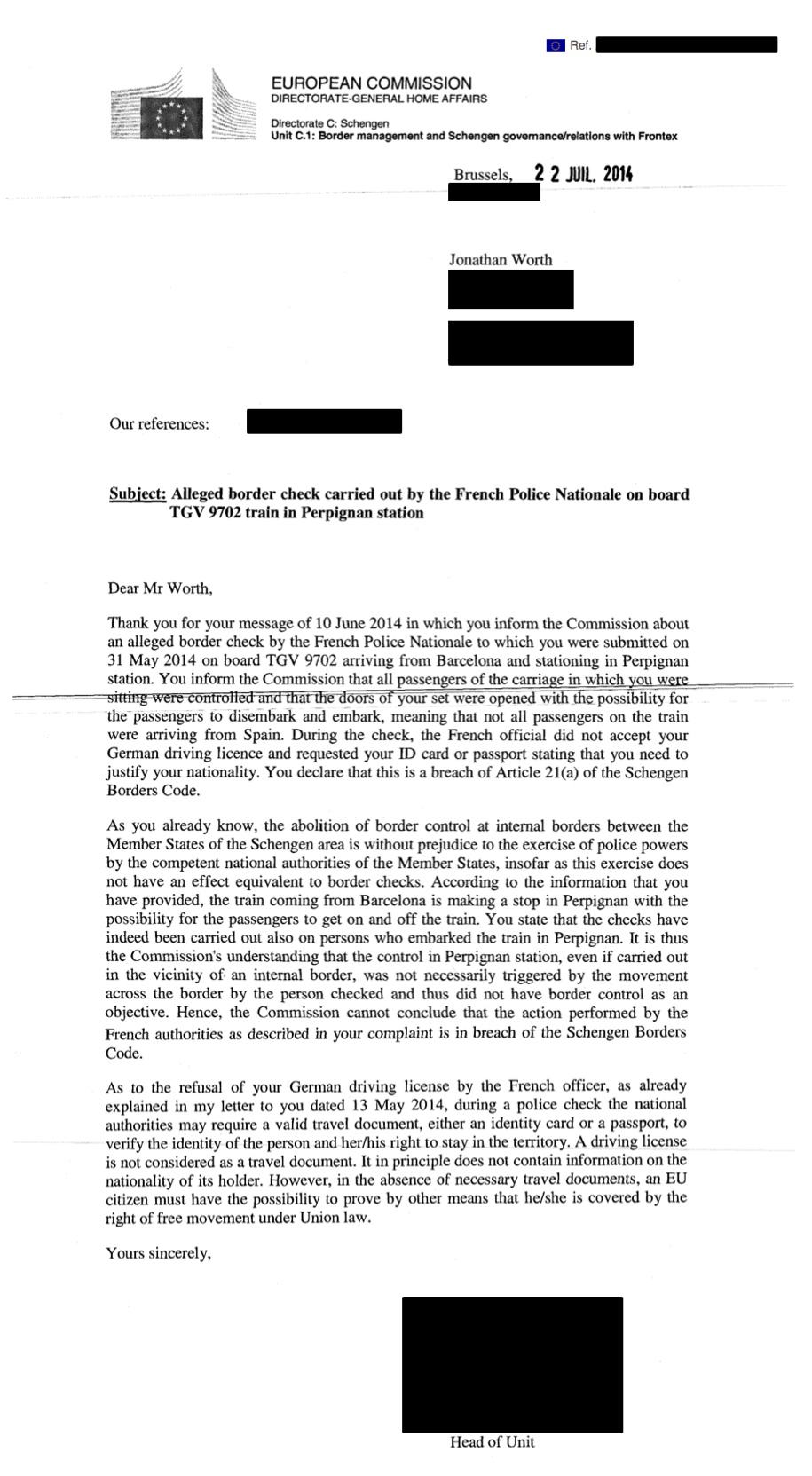Back in May I was subjected to the most extraordinary border control identity check at Perpignan station. I have blogged the transcript of the encounter here, and sent this to the European Commission, hoping they see this as non-Schengen compliant. The redacted letter of response from the Commission is here:
 Reading this I now come to the conclusion that I do not know what I have to do to make the European Commission take any such complaint seriously.
Reading this I now come to the conclusion that I do not know what I have to do to make the European Commission take any such complaint seriously.
Taking apart each aspect of the Perpignan complaint…
- I can be certain only one carriage of the TGV was controlled, but due to the time the police boarded and left I think it was the whole train. How, other than to follow the police officers, can I control this?
- The Commission reply makes a lot of the fact that the doors of the carriage were already open, and that this was hence not a border control. Why then is the Commission so insistent that Member States are allowed to add their own ID requirements when the French rules are here, and were exceeded. Is the Commission just not going anywhere near national ID rules?
- The Police Officer clearly said to me that he is allowed to control who he wants, whenever he wants. This, at a border station, is a clear breach of the Schengen Borders Code. Why did the Commission response not even mention this?
- I was sworn at by the police officer, and again there is no mention of this. I suppose I ought to complain in France about that?
All of this does make me wonder: what do I actually have to do to get the Commission to take these issues seriously? Their previous response, to my Rzepin complaint, is here. I have personally been subjected to questionable checks in Perpignan, Rzepin, Padborg, Puttgarden, Buchs and Modane, and have documented a legally correct check at Puttgarden, and longer in the past faced checks at Paris Bercy and Brenner. I have never, ever, been subjected to an ID check in a train that was anywhere other than near a border (with the exception of Paris Bercy, but that was a non-stop service to Spain from Paris).
I am aware that the plural of anecdote is not data (and that’s the reason I built FreeMovement.net) but the pattern of these checks is very clear – in mentality at least when it comes to EU cross border rail, it’s as if the borders within Schengen never went away. How can I get the Commission to take this seriously?














Jon,
I fear the Commission knows that to meddle in attempts by member states to control their own borders will make it politically very unpopular. It simply does not want to rock the boat. Despite the best of intentions, the EU institutions are intergovernmental and not rooted in the interests of the citizen. It suits many countries to pay lip-service to the Schengen rules rather than change old habits.
According to the reply, it seems that France is allowed to check anyone at any time, *except* when entering the country. In this case, you had already entered the country, so it was now legal to check you. This may mean that it was in compliance with Schengen rules.
I think that you should instead question whether it was in compliance with French rules, which stipulate how and when someone may be checked in France, and what documents you need to show. If you can show that the policeman didn’t follow French rules, then you could maybe complain to the French authorities (but I’m not sure what else you could do if that fails).
Hi John, thank you for this very interesting piece.
I was asked for identification this week on the Rzepin route and the story was similar. But this time, the people checking were security guards, not police. After I calmly challenged them on the identification point, they put me in a strangle hold and marched me out of the carriage. They refused to identify themselves. I‘m still in shock and don’t know where I should go with this — a police report or a similar complaint as yours? Or both?
I’m so sorry I spelt your name wrong, Jon not John!